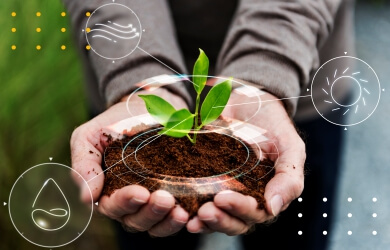Agritech: Enabling a Smarter and Sustainable Agriculture Future
April 11, 2022
FarmERP

With the constantly increasing global population count, the demand for food production is also skyrocketing with every passing day. This, coupled with the increased utilisation of resources, is driving the need for a more sustainable approach to food production. Innovations in agritech are making it possible for food producers to employ sustainable agriculture practices and produce good-quality food with a reduced impact on the environment.
Moving towards a cleaner and greener future is the necessity for the well-being of our planet as well as its residents, i.e. us. But how can this be achieved? Agritech advancements and innovations can be the key factors enabling sustainable and environment-friendly agricultural practices. The use of weather stations, sensors, drones, maps, as well as maps and analytics can be crucial in ensuring that your farming practices are not harmful to the environment.
In this article, we bring to you 5 of the best agritech solutions that contribute to making agriculture more sustainable and environment-friendly.
